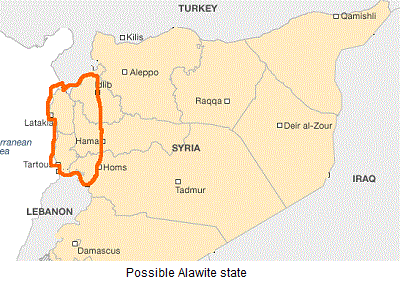

 (AINA) -- It is well known that most Christians in Syria support Assad's regime because they fear what may come instead, given the experience in Iraq and Egypt. But if the regime falls, only certain Christian groups would benefit, while others would be regarded as traitors by the Sunni majority.
(AINA) -- It is well known that most Christians in Syria support Assad's regime because they fear what may come instead, given the experience in Iraq and Egypt. But if the regime falls, only certain Christian groups would benefit, while others would be regarded as traitors by the Sunni majority.
A friend and I have the last days discussed ideas and analysis of Syria's future, the day Assad's regime is no longer able to keep the country in its grip. My friend was born and raised in Aleppo, but he lives abroad. Recently he sat down and studied the map of Syria. He wanted to see in which parts of the country the army is heavily engaged. It is mostly in the cities of Homs, Hama, Houla, Jisr el Shughoor, and Rastin (in the West). Not so much in other strong Sunni strongholds like Aleppo, Deir-Zor or Dara'a, where the uprising began in March 2011.
Is there a reason behind this? Of course we can't know for sure, but a strategy may be that the regime wants to achieve an cleansing of Sunnis in some areas west of the river Al-Assi (Orontes in Latin) in order to create facts on the ground. Sunni Arabs will then be terrorized and forced to flee. When the regime eventually realizes that the battle for all of Syria is lost, the Alawites will withdraw and form their own state with one Christian group. Its boundaries would then be the river Assi's western bank to the East, the Mediterranean Sea to the west, Lebanon to the south and Turkey to the north.
The Christians in question are called Melkites, those who once joined the Byzantine king of Constantinople. In the Middle East the Greek Orthodox Melkites are therfore called Roum Orthodox and Catholic Melkites are Roum Catholic. The word Roum comes from the Eastern Roman Empire and the designation Melkites is now used mainly for Greek Catholics. They live mainly in the area of Wadi Al-Nasara (The Christian valley) in the coastal region and would represent at least one third of the population in the new Alawite State. The Russian fleet in the port city of Tartus would offer protection to Melkites and Alawites. In return, the Russians, who are Orthodox, would have free access to the important Mediterranean port of Tartus.
The Alawite minority tried to form an independent state in the 1940s, when the French left Syria, but did not succeed. A few decades later, they took power by a military coup and have ruled the country with an iron fist ever since. During all these years, Alawites had the support of many Christian minorities, but some Christian groups like Melkites have allied with the regime and can thus be included in a future Alawite state. The majority of Melkites are members of the Baath party or Qawmi Suri (Pansyrian Nationalist Party). Qawmi Suri is now divided into two factions. One of them is a close associate of Assad's regime.
This video illustrates how closely Melkites are allied with the regime. It is from Easter celebrations in the city of Lattakia in 2010. What is remarkable is that persons shoot in the air with automatic rifles and other arms outside the church for several minutes. This comes at a time and in a country where no one may carry even a pocket knife -- unless one is a member of the ruling Baath Party.
So it is only some Christian groups that may benefit from their support for the regime, while others may draw a blank. Church leaders, such as the Syriac Orthodox Patriarch Zakka Iwas, support a fragile regime. The same applies to the Assyrian Church of the East and other churches. Their supporters may be left to their fate the day the regime falls. They are likely to be considered as traitors in the eyes of Sunnis.
What about the Assyrian Democratic Organization, ADO, which has sided with the opposition right from the start? ADO and its followers took a stand against the church leadership, and allied themselves with the Muslim majority of the Syrian population, seeking freedom. After all, Assyrians are just like Sunnis and other groups deprived of their political rights in Syria.
Can the Assyrians -- the indigenous people of Al-Jazira and northern Iraq -- by virtue of ADO's position assert their rights in what is left of Syria when the Alawites break away? It remains to be seen. In the province of Al-Jazira in northeastern Syria, there are also the Kurds, with strong claims to connect the area to a possible Kurdish state in northern Iraq. Kurdish aspirations may collide with Assyrian aspirations, as in Iraq, if the Kurds in Syria and Iraq are not predisposed to peaceful coexistence with Assyrians.
According to political scientist Ilan DeBasso, from Sweden, If we compare what happened to Assyrians in Iraq, it is not likely the Assyrians in Syria would flee the country. One important difference is that the Assyrians in Syria have been politically active longer than their brethren in Iraq, says DeBasso.
Let's hope he's right and that the mass exodus of Assyrians from Al-Jazira will not be a result of the ongoing freedom struggle in Syria. At this point Assyrian church leaders bear a heavy responsibility; they ally themselves with Assad's regime without a strategy for the future. It is different with the Melkite patriarch's support for the regime; they are likely to greatly benefit from their alliance with the Alawite minority in Syria.
Augin Kurt Haninke is an Assyrian journalist in Sweden. He is the editor in chief of Assyria TV.

or register to post a comment.